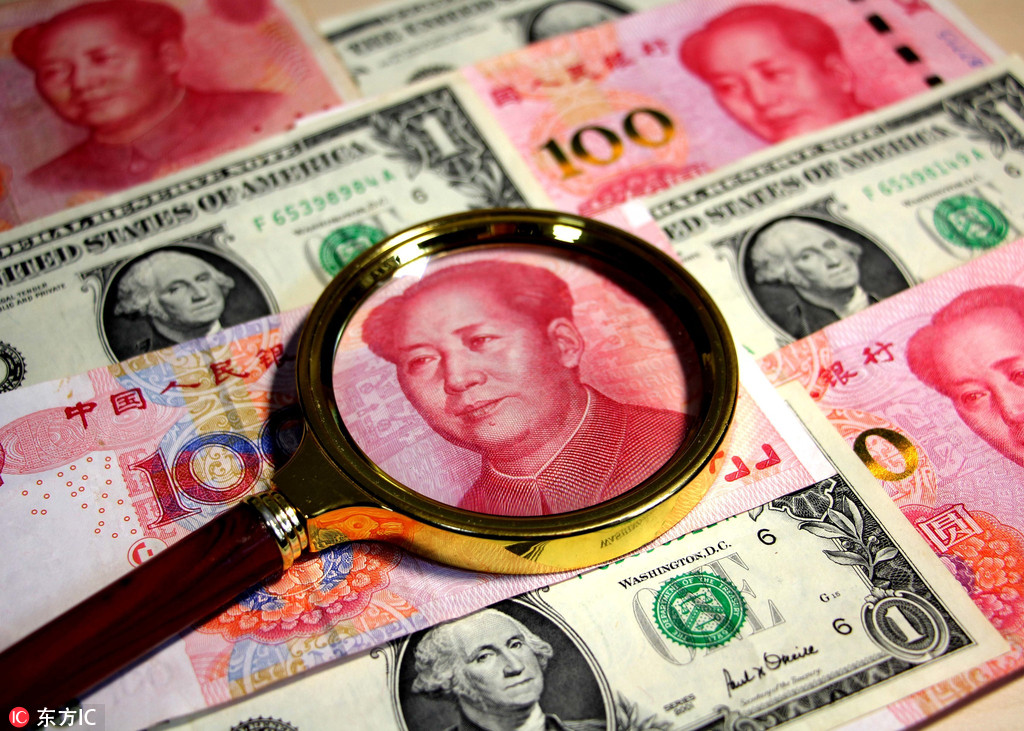Big fluctuations of yuan unlikely
By Chen Jia | China Daily | Updated: 2018-06-23 04:13

Exchange rate expected to move at a 'reasonable level' vs US dollar
The exchange rate of the yuan weakened to a five-month low against the US dollar on Friday, but analysts said they did not expect Chinese authorities to use depreciation of the Chinese currency as a way to help it gain amid trade tensions with the United States.
They also said there would not likely be any drastic fluctuations of the yuan, based on the country's economic resilience.
The yuan's central parity rate, around which the yuan's spot exchange rate is allowed to rise or fall by 2 percent each trading day, weakened by 98 basis points to 6.4804 against the US dollar on Friday, the lowest since Jan 12, according to the China Foreign Exchange Trade System.
"The yuan's recent weakness is mainly because of the rebound in the US dollar," said Raymond Yeung, chief economist for Greater China at Australia and New Zealand Banking Group.
"China's central bank will likely maintain the current policy to allow the yuan's exchange rate to move at a reasonable level," said Yeung. "China will not and has no intention to push for competitive depreciation."
The US dollar appreciated against other major currencies and weakened the US competitiveness of exports, which will enlarge its trade deficits, he added.
Guan Tao, former director of the international payment department of the State Administration of Foreign Exchange, suggested that foreign exchange investors neither overreact on the trade dispute nor turn bearish about the yuan. "In the medium to long term, the possibility is slim that there will be deep depreciation of the yuan," Guan said.
A spokesperson from the State Administration of Foreign Exchange said in a statement on Tuesday that the Chinese economy has maintained stable and sound growth momentum since May, effectively stabilizing market expectations and adapting better to changes in the external environment. "It (the stable economy) has provided the basic guarantee for the smooth running of the foreign exchange market," the spokesperson said.
According to a recent survey from the central bank, Chinese entrepreneurs' confidence in future business strengthened in the second quarter, shown by an index that rose to 75.8 from 74.2 in the first three months, because of resilient economic growth and prominent achievements of high-quality development.
The strengthening dollar has prompted market volatility this year, especially in emerging economies, and investors expressed further concerns after the administration of US President Donald Trump threatened to slap a 10 percent tariff on $200 billion of Chinese products.
Zhao Xijun, deputy dean of the School of Finance at Renmin University of China, said the capricious US trade policy and the US Federal Reserve's monetary policy normalization have led recently to drastic fluctuations and uncertainties in global financial markets as well as for the Chinese foreign exchange market.
Following the Fed's rate hike, the US dollar strengthened in the past week to its highest level in more than a year against other major currencies.
"China has started pre-emptive measures to buffer the negative impacts of rising trade and investment tensions between China and the US," said Iris Pang, an economist at ING Bank.
She said she believed that further opening of the country's financial market will attract more capital inflows in the near future to offset outflows induced by expectation of the yuan weakening, and that could help to keep foreign exchange reserves at a stable level.
























